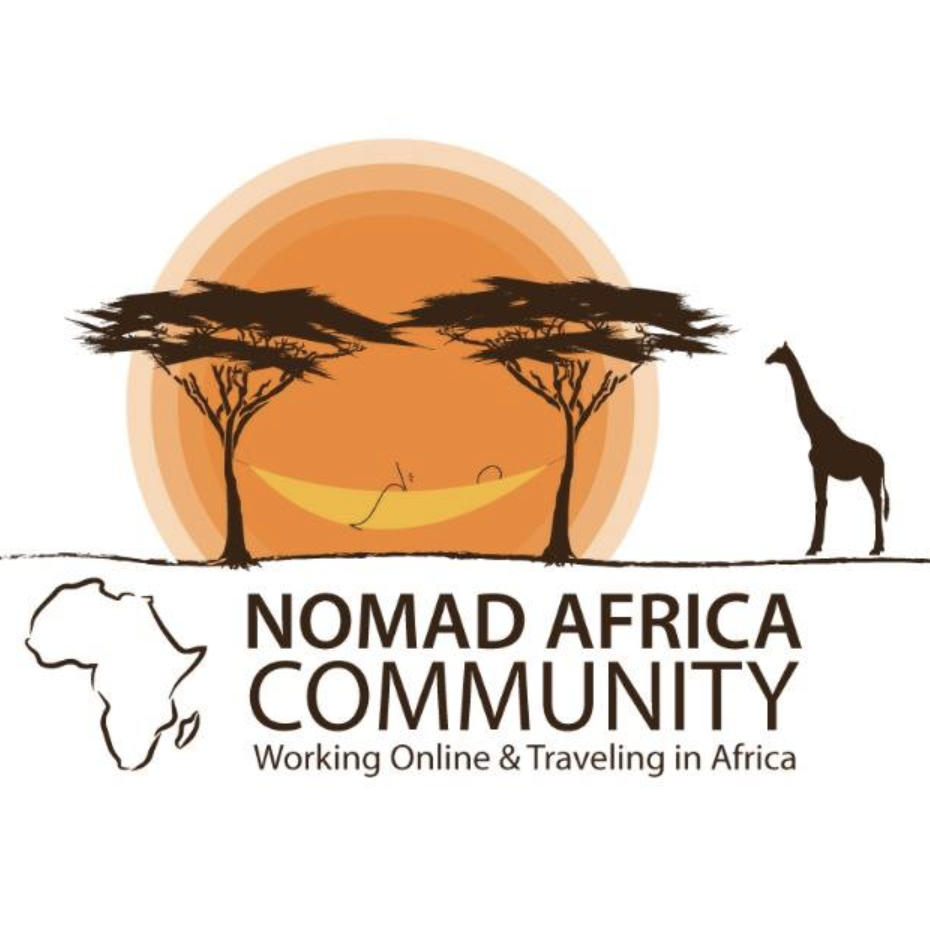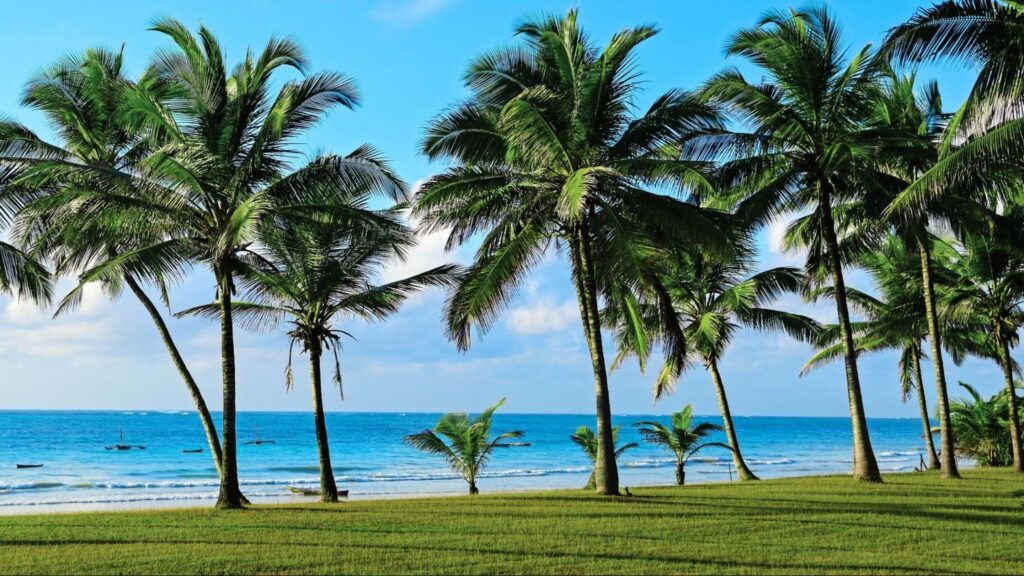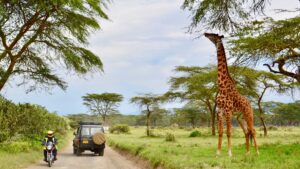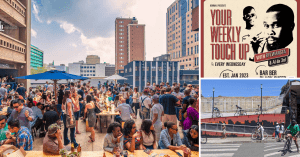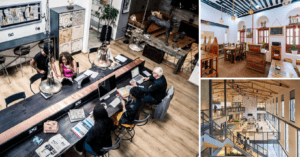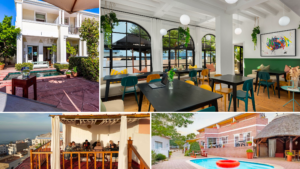Are you a digital nomad looking to experience the vibrant culture and beautiful landscapes of Nigeria? Look no further, because this guide is here to help you navigate the digital nomad lifestyle in Nigeria!
With its growing tech scene and affordable cost of living, Nigeria is becoming an increasingly popular destination for digital nomads. Whether you’re working remotely or freelancing, this guide will provide you with all the information you need to make the most of your time as a digital nomad in Nigeria. From finding the best co-working spaces to exploring local cuisine and attractions, get ready for an adventure like no other!
Jump To:
Things to Do in Nigeria | Destinations | Internet | Coworking Spaces | Coliving Spaces | Best Times to Visit | Visas | Cost of Living | How to Get There | Safety and Security | Frequently Asked Questions
| Main Languages | English, Nigerian Pidgin, Hausa, Yoruba, Igbo |
| Capital city | Abuja |
| Main airport | Murtala Muhammed International Airport (Lagos); Nnamdi Azikiwe International Airport (Abuja); Port Harcourt International Airport (Rivers) |
| Currency | Nigerian Naira (NGN) |
| Time Zone | West African Time (UTC +1) |
| Plug Socket Type | Type D and Type G |
| Best time(s) to Visit | November to February |
| Internet Quality | Good |
| Highlights | Lagos – Vibrant City; Abuja – Modern Capital; Rich Culture and Diversity |
Things to Do in Nigeria
Nigeria is a country that has a lot to offer digital nomads. From its vibrant culture to its low cost of living, there are many reasons why Nigeria is becoming an increasingly popular destination for digital nomads.
Explore Lagos
Lagos is Nigeria’s largest city and is known for its bustling streets, vibrant nightlife, and beautiful beaches. You can explore the city’s many markets, museums, and galleries, or take a stroll along the waterfront and watch the boats sail by. Lagos is also home to some of Nigeria’s best restaurants, serving up delicious local cuisine as well as international dishes.
Visit Abuja
Abuja is Nigeria’s capital city and is a great place to visit if you’re interested in history and culture. The city is home to many museums and galleries, as well as the Nigerian National Mosque and the Nigerian National Christian Centre. You can also explore the city’s many parks and gardens, or take a trip to nearby Zuma Rock, a 725m-tall monolith that is one of Nigeria’s most recognizable landmarks.
Experience Port Harcourt
Port Harcourt is a bustling port city that is known for its lively music scene and vibrant nightlife. You can explore the city’s many clubs and bars, or take a boat trip along the river and enjoy the beautiful scenery. Port Harcourt is also home to some of Nigeria’s best beaches, where you can relax and soak up the sun.
Try Local Food
Nigeria is known for its delicious cuisine, which is a blend of African, European, and Asian influences. Some of the most popular dishes include jollof rice, pounded yam, and egusi soup. You can try these dishes and more at local restaurants and markets throughout the country.
Transportation
Getting around Nigeria can be a challenge, but there are many options available. Taxis and buses are the most common forms of transportation, but you can also rent a car or take a motorcycle taxi (known as an okada). Be prepared for traffic and delays, especially in the larger cities.
Entertainment
Nigeria is known for its lively music scene, with many popular musicians and bands hailing from the country. You can catch live music performances at clubs and bars throughout the country. There are also many festivals and events throughout the year, including the Lagos Carnival and the Abuja International Film Festival.
Sailing
Nigeria has a beautiful coastline and there are many opportunities for sailing and water sports. You can rent a boat or join a sailing tour to explore the coastline and enjoy the beautiful scenery.
Beaches
Nigeria has many beautiful beaches, including Tarkwa Bay and Bar Beach in Lagos, and Finima Beach in Port Harcourt. These beaches offer opportunities for swimming, sunbathing, and water sports. Be aware of safety concerns and follow local advice when swimming in the ocean.
Best Places to Live in Nigeria for Digital Nomads
If you’re a digital nomad looking for a place to live in Nigeria, there are several cities that offer great opportunities to work and explore. Here are some of the best places to live in Nigeria for digital nomads:
Lagos
Lagos is the largest city in Nigeria and one of the fastest-growing cities in Africa. It’s a bustling metropolis with a vibrant culture, excellent food, and a thriving nightlife. Lagos is also home to several co-working spaces, cafes, and other work-friendly venues that are perfect for digital nomads. The city has a high-speed internet connection, making it easy to work remotely. Lagos also has several beaches, parks, and other outdoor spaces that are perfect for relaxing after a long day of work.
Abuja
Abuja is the capital city of Nigeria and a great place for digital nomads who prefer a quieter lifestyle. The city has a low crime rate and is known for its clean streets and well-maintained infrastructure. Abuja is also home to several co-working spaces and cafes that are perfect for remote workers. The city’s central location makes it easy to explore other parts of Nigeria, including national parks, wildlife reserves, and other attractions.
Port Harcourt
Port Harcourt is a fast-growing city in Nigeria and a great place for digital nomads who love the outdoors. The city is located near several national parks and wildlife reserves, making it easy to explore Nigeria’s natural beauty. Port Harcourt is also home to several co-working spaces and cafes that are perfect for remote workers. The city has a high-speed internet connection, making it easy to work remotely.
Ibadan
Ibadan is a historic city in Nigeria and a great place for digital nomads who love culture and history. The city has several museums, galleries, and other cultural attractions that are perfect for exploring during your free time. Ibadan is also home to several co-working spaces and cafes that are perfect for remote workers. The city has a high-speed internet connection, making it easy to work remotely.
Benin City
Benin City is a vibrant city in Nigeria and a great place for digital nomads who love art and culture. The city has several art galleries, museums, and other cultural attractions that are perfect for exploring during your free time. Benin City is also home to several co-working spaces and cafes that are perfect for remote workers. The city has a high-speed internet connection, making it easy to work remotely.
Overall, Nigeria has several great cities that are perfect for digital nomads. Whether you prefer a bustling metropolis or a quiet and peaceful environment, there’s a city in Nigeria that’s perfect for you.
Internet Connectivity
As a digital nomad in Nigeria, reliable internet access is crucial for your remote work. Fortunately, Nigeria has a growing internet infrastructure, and you can find internet access in most urban areas. However, there are still some challenges that you need to be aware of.
When it comes to internet access, there are two main options: mobile data and broadband. Mobile data is the most common and convenient option, and you can easily purchase a SIM card from any of the major mobile network providers like MTN, Glo, Airtel, and 9Mobile. These providers offer various data plans, so you can choose one that suits your needs and budget. However, keep in mind that mobile data can be expensive, and the speed and reliability can vary depending on your location.
Broadband is another option for internet access, and it provides faster and more reliable connectivity than mobile data. However, broadband is not as widely available as mobile data, and it can be more expensive. You can find broadband services in major cities like Lagos, Abuja, and Port Harcourt, and some providers offer unlimited data plans.
To find the best internet connectivity options in Nigeria, you can use online resources like Nomadlist or Freaking Nomads, which provide recommendations and reviews from other digital nomads.
In addition to mobile data and broadband, you can also find free Wi-Fi hotspots in public places like cafes, restaurants, and libraries. However, keep in mind that public Wi-Fi networks can be insecure, so it’s important to use a VPN to protect your online privacy and security.
Overall, Nigeria has a growing internet infrastructure, and you can find reliable internet access in most urban areas. By choosing the right internet connectivity option for your needs and budget and using online resources to find the best options, you can stay connected and productive as a digital nomad in Nigeria.
Coworking Spaces in Nigeria
If you’re a digital nomad looking for a coworking space in Nigeria, you’re in luck. Nigeria has a growing number of coworking spaces that offer reliable internet, comfortable workspaces, and opportunities to network with other professionals.
Co-working Spaces
There are several coworking spaces in Nigeria that cater specifically to digital nomads and remote workers. Some of the most popular ones include:
- Community Park Abuja: This coworking space is located in the heart of Abuja and offers flexible workspaces, high-speed internet, and a vibrant community of professionals.
- Box Office Hub Metro Centre Abuja: This coworking space is located in the central business district of Abuja and offers private offices, dedicated desks, and hot desks. They also have meeting rooms and event spaces for rent.
- IC7 Africa Abuja: This coworking space is located in the Jabi Lake Mall in Abuja and offers a variety of workspaces, including private offices, hot desks, and meeting rooms.
Remote Work
Many companies in Nigeria are also open to remote work arrangements, especially in the tech industry. If you’re a skilled professional with experience in software development, digital marketing, or graphic design, you may be able to find remote work opportunities with Nigerian companies.
Some popular job boards for remote work in Nigeria include:
Overall, Nigeria is a great destination for digital nomads and remote workers, with plenty of coworking spaces and remote work opportunities available.
Coliving Spaces in Nigeria
If you’re a digital nomad looking for a place to stay in Nigeria, coliving spaces can be a great option. Not only do they provide affordable accommodation, but they also offer a community of like-minded individuals who are also working remotely.
Here are a few coliving spaces in Nigeria that you might want to consider:
Coliving.com
Coliving.com is a platform that connects digital nomads with coliving spaces around the world. In Nigeria, they offer a few options, including a coliving space in Lagos. The space includes private rooms, shared workspaces, and communal areas like a kitchen and living room. Prices start at around $500 a month.
Co-Creation Hub
Co-Creation Hub is a popular coworking space in Lagos that also offers coliving options. Their coliving space includes private rooms, shared workspaces, and access to all of the amenities at their coworking space. Prices start at around $700 a month.
Workstation
Workstation is another coworking space in Lagos that offers coliving options. Their coliving space includes private rooms, shared workspaces, and access to all of the amenities at their coworking space. Prices start at around $600 a month.
Nomad Stays
Nomad Stays is a platform that connects digital nomads with accommodation options around the world. In Nigeria, they offer a few options, including a coliving space in Lagos. The space includes private rooms, shared workspaces, and communal areas like a kitchen and living room. Prices start at around $500 a month.
Overall, coliving spaces can be a great option for digital nomads looking for affordable accommodation and a community of like-minded individuals. Make sure to do your research and find a space that fits your needs and budget.
Best Times to Visit in Nigeria
If you are planning to visit Nigeria as a digital nomad, it’s important to choose the right time of year to make the most of your trip. Nigeria has a tropical climate, with two distinct seasons: the dry season and the rainy season.
The best time to visit Nigeria is during the dry season, which runs from November to March. During this time, the weather is warm and sunny, with little to no rain. This makes it an ideal time for outdoor activities and exploring the country’s many attractions.
In addition, the dry season coincides with many of Nigeria’s festivals and cultural events, making it a great time to experience the local culture. Some of the most popular festivals during this time include the Lagos Carnival, the Osun-Osogbo Festival, and the Argungu Fishing Festival.
Worst Times to Visit
The worst time to visit Nigeria is during the rainy season, which runs from April to October. During this time, the weather can be hot and humid, with frequent heavy rainstorms. This can make it difficult to get around and enjoy outdoor activities.
In addition, the rainy season can bring with it the risk of flooding and other natural disasters. If you do choose to visit Nigeria during the rainy season, be sure to take appropriate precautions and stay up-to-date on weather conditions.
Overall, the best time to visit Nigeria as a digital nomad is during the dry season, when the weather is pleasant and there are plenty of cultural events to enjoy. However, if you do need to visit during the rainy season, be sure to plan accordingly and stay safe.
Tourist and Digital Nomad Visas
If you are planning to visit Nigeria as a digital nomad or a tourist, you need to know the visa requirements. Nigeria offers different types of visas, including tourist and digital nomad visas.
Tourist Visa
If you are planning to visit Nigeria as a tourist, you need to apply for a tourist visa. The tourist visa is issued for a maximum of 90 days and can be extended for another 90 days. To apply for a tourist visa, you need to provide the following documents:
- A valid passport
- Two passport-sized photographs
- A completed visa application form
- Proof of accommodation
- Proof of return ticket
- Proof of sufficient funds
Digital Nomad Visa
Nigeria does not currently offer a specific digital nomad visa. However, there are plans to introduce a digital nomad visa in the future. Keep an eye on the Nigerian immigration website for updates.
In the meantime, as a digital nomad, you can apply for a business visa. The business visa is valid for a maximum of 90 days and can be extended for another 90 days. To apply for a business visa, you need to provide the following documents:
- A valid passport
- Two passport-sized photographs
- A completed visa application form
- A letter of invitation from a Nigerian company
- Proof of accommodation
- Proof of return ticket
- Proof of sufficient funds
Residency
If you are planning to stay in Nigeria for an extended period, you can apply for a residency permit. The residency permit allows you to stay in Nigeria for up to two years. To apply for a residency permit, you need to provide the following documents:
- A valid passport
- Two passport-sized photographs
- A completed residency permit application form
- A letter of introduction from your employer or sponsor
- A medical certificate
- A police clearance certificate
- Proof of accommodation
- Proof of sufficient funds
Note that the above information is subject to change. It is always best to check with the Nigerian embassy or consulate in your home country for the latest visa and immigration requirements.
Cost of Living
When it comes to the cost of living in Nigeria, it is generally considered to be affordable for digital nomads. The average monthly budget for a digital nomad in Nigeria can range from $1,000 to $1,500, depending on your lifestyle and spending habits.
Keep in mind that the cost of living in Nigeria is typically cheaper outside of the major cities like Lagos, Abuja, and Port Harcourt. In these cities, the cost of living can be higher due to the higher demand for goods and services.
When it comes to currency, the Nigerian Naira (NGN) is the official currency of Nigeria. As of June 2023, the exchange rate for 1 USD is approximately 650 NGN. It is important to keep an eye on the exchange rate if you are planning to convert your currency to Nigerian Naira.
Here are some examples of the cost of living in Nigeria:
- Accommodation: A one-bedroom apartment in the city center can cost around 100,000 NGN ($154 USD) per month, while a one-bedroom apartment outside the city center can cost around 60,000 NGN ($93 USD) per month.
- Transportation: A one-way ticket on local transport can cost around 150 NGN ($0.37 USD).
- Food: A meal at an inexpensive restaurant can cost around 1,500 NGN ($3.66 USD), while a three-course meal for two at a mid-range restaurant can cost around 20,000 NGN ($49 USD).
- Internet: A 10 Mbps internet connection can cost around 20,000 NGN ($49 USD) per month.
Overall, the cost of living in Nigeria is relatively affordable for digital nomads, especially if you are willing to live outside of the major cities and be mindful of your spending.
How to Get to Nigeria
If you’re a digital nomad planning to travel to Nigeria, you’ll need to know how to get there. Fortunately, there are several options available to you, depending on your location and budget.
By Air
The easiest and most common way to get to Nigeria is by air. The country has several international airports, including Murtala Muhammed International Airport in Lagos, Nnamdi Azikiwe International Airport in Abuja, and Port Harcourt International Airport in Port Harcourt. These airports are served by many major airlines, including Emirates, British Airways, and Delta.
By Land
If you’re already in a neighboring country, such as Benin or Cameroon, you can enter Nigeria by land. There are several border crossings between Nigeria and its neighbors, and you can cross by car or bus. However, be aware that border crossings can be time-consuming and sometimes difficult, so be sure to have all necessary documents and visas in order.
By Sea
Nigeria also has several seaports, including Lagos Port Complex and Port Harcourt Port. If you’re coming from another African country, you may be able to take a cargo ship or ferry to Nigeria. However, this option is not common and can be expensive.
Visa Requirements
Before you travel to Nigeria, you’ll need to obtain a visa. You can apply for a visa at a Nigerian embassy or consulate in your home country. The visa application process can take several weeks, so be sure to apply well in advance of your trip. You’ll also need to have a valid passport with at least six months remaining before it expires.
Transportation within Nigeria
Once you arrive in Nigeria, you’ll need to figure out how to get around. The country has a decent transportation system, including buses, taxis, and ride-sharing services like Uber and Bolt. However, traffic can be heavy and chaotic, so be prepared for delays. If you’re staying in a major city like Lagos or Abuja, you may also want to consider renting a car or hiring a driver for added convenience.
Culture and Lifestyle
Nigeria is a country with a rich cultural heritage that is reflected in its art, music, cuisine, festivals, and local customs. As a digital nomad, it is important to understand and appreciate the culture and lifestyle of the country you are visiting. This will help you to better connect with the locals and make the most of your time in Nigeria.
Culture and History
Nigeria is home to over 250 ethnic groups, each with its own unique culture and history. The country’s diverse culture is reflected in its art, music, and literature. Nigeria is also known for its Nollywood film industry, which produces more movies than Hollywood.
Cuisine
Nigerian cuisine is a fusion of African, European, and Asian influences. The country’s most popular dishes include jollof rice, pounded yam, egusi soup, and suya. Nigerian cuisine is known for its bold flavors, use of spices, and generous portions.
Art and Music
Nigeria has a vibrant art scene, with traditional and contemporary art forms coexisting side by side. The country is home to several art galleries and museums, including the National Museum in Lagos. Nigerian music is also diverse, with traditional folk music, highlife, juju, and afrobeat being some of the most popular genres.
Festivals
Nigeria is home to several festivals throughout the year, each celebrating a different aspect of the country’s culture and history. Some of the most popular festivals include the Lagos Carnival, the Osun-Osogbo Festival, and the Eyo Festival. These festivals offer a unique opportunity to experience Nigerian culture and connect with the locals.
As a digital nomad in Nigeria, it is important to be aware of the local customs and traditions. This will help you to avoid any cultural misunderstandings and show respect to the locals. It is also important to note that English is the official language in Nigeria, but there may be some language barriers in more rural areas.
To stay connected with the local culture and community, consider joining a local forum or newsletter. This will give you access to information about upcoming events and activities. You can also create a social media account to connect with locals and other digital nomads in Nigeria.
In conclusion, Nigeria is a country with a rich cultural heritage that is reflected in its art, music, cuisine, festivals, and local customs. As a digital nomad, it is important to understand and appreciate the culture and lifestyle of the country you are visiting. This will help you to better connect with the locals and make the most of your time in Nigeria.
Safety and Security
As a digital nomad in Nigeria, your safety and security should be a top priority. While Nigeria has a reputation for high crime rates, there are steps you can take to reduce your risk and stay safe.
Crime and Safety
Nigeria has a relatively high crime rate, particularly in urban areas. Petty crime, such as pickpocketing and theft, is common, especially in crowded areas. Violent crime, including armed robbery and kidnapping, can also occur, particularly in the Niger Delta region, the northeast, and some parts of Lagos.
To minimize your risk of becoming a victim of crime, it is important to take precautions such as:
- Avoid walking alone at night, particularly in poorly lit areas.
- Be aware of your surroundings and avoid displaying expensive items such as jewelry or electronics.
- Use a reputable taxi service or ride-sharing app when traveling at night.
- Keep your valuables locked in a safe or secure location when not in use.
- Stay up-to-date on local news and security alerts.
Amenities and Infrastructure
Nigeria has a relatively developed infrastructure, with good road networks and public transportation systems in major cities. However, power outages and water shortages can occur, particularly in rural areas.
To ensure your safety and comfort, it is important to research your accommodation options carefully and choose a location with reliable amenities and infrastructure.
Healthcare and Medical Facilities
Nigeria has a public healthcare system, but the quality of care can vary widely and medical facilities may not be up to Western standards. Private healthcare facilities are available in major cities but can be expensive.
It is recommended that you obtain comprehensive travel insurance that includes medical coverage before traveling to Nigeria. In the event of a medical emergency, it is important to seek medical attention as soon as possible.
Water
Tap water in Nigeria is not safe to drink, and bottled water is widely available. It is important to stay hydrated, particularly in hot and humid weather, but be sure to purchase bottled water from a reputable source.
Fear
While Nigeria can be an intimidating place for first-time visitors, it is important to remember that most Nigerians are friendly and welcoming. By taking precautions and staying aware of your surroundings, you can reduce your risk of becoming a victim of crime and enjoy a safe and productive stay in Nigeria.
Frequently Asked Questions
What are the requirements to obtain a digital nomad visa in Nigeria?
As of June 2023, Nigeria does not offer a specific digital nomad visa. However, you can apply for a business visa or a tourist visa to enter the country. To obtain a business visa, you will need a letter of invitation from a Nigerian company, while a tourist visa requires proof of accommodation and sufficient funds to cover your stay.
Which cities in Nigeria are best for digital nomads?
Lagos, Abuja, and Port Harcourt are the most popular cities for digital nomads in Nigeria. Lagos is the economic hub of the country and offers a vibrant cultural scene, while Abuja is the political capital and has a more relaxed atmosphere. Port Harcourt is known for its oil and gas industry and offers a more laid-back lifestyle.
What is the cost of living for digital nomads in Nigeria?
The cost of living in Nigeria is relatively low compared to other countries, but it can vary depending on your lifestyle and location. On average, you can expect to spend around $1,500 to $2,000 per month for accommodation, food, transportation, and other basic needs.
Are there any coworking spaces in Lagos for digital nomads?
Yes, there are several coworking spaces in Lagos that cater to digital nomads. Some of the most popular options include Capital Square, Seedspace, and Workstation. These spaces offer reliable internet, comfortable workspaces, and networking opportunities.
What are the best resources for finding accommodation in Nigeria as a digital nomad?
There are several online resources for finding accommodation in Nigeria as a digital nomad. Some of the most popular options include Airbnb, Jumia Travel, and Hotels.ng. It’s also a good idea to join local Facebook groups or ask for recommendations from other digital nomads.
What are the top industries for digital nomads in Nigeria?
The top industries for digital nomads in Nigeria include tech, finance, and media. The country has a growing startup scene, and there are several opportunities for remote work in these industries. Additionally, Nigeria has a large and active social media and blogging community, making it a great destination for content creators.
